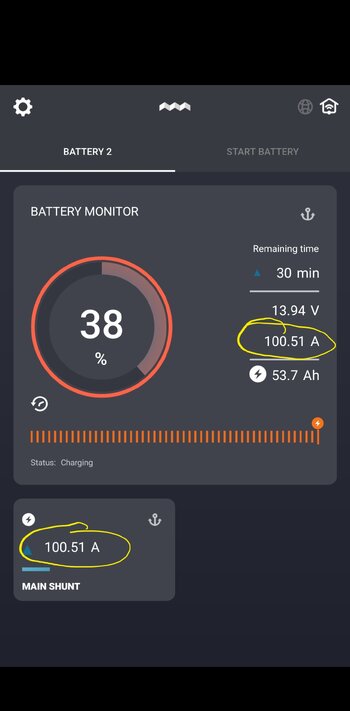I have been away a few times with only a watt/current metre on solar panels and a votage metre on the second battery to determine battery health, which to be fair has worked well as I've never had a problem, but I wanted a more detailed way to monitor battery health status.
I installed a simarine unit including a quad shunt for accessories power use and a main shunt for battery monitoring.
When over drawing one night (due to overloading the fridge, turning it up, and forgeting I had) pulling the battery down to 38% I started the car to boost charging and saw over 100 amps being pushed back into the second battery from the 120/250 combo. (Other than the 250 being added, it is wired as Ineos did it) Clearly this system does work and can work well. Having used it for a bit, i am not disappointed.
I have wired my installed accessories to the second battery (usbs/cig sockets/anderson plugs) with the only draw on the main battery other than ineos stuff, being a uhf radio and an led camp light on a roof socket. I would like to move the 3 roof sockets over to the second battery but haven't yet.
It feels to me that the car's system does not like the batteries to be fully charged with 85% being the goldilocks number. Anecdotally I feel If you drop into the 70s it will crank up the charge current but after 85% it fights you on full charging by bleeding off charge somehow and only very slowly charging. But you can get 100% through long driving or constant solar input.
At this stage I have no reason or desire to change the system. I can see what it is doing and it appears to be working... for me.
I installed a simarine unit including a quad shunt for accessories power use and a main shunt for battery monitoring.
When over drawing one night (due to overloading the fridge, turning it up, and forgeting I had) pulling the battery down to 38% I started the car to boost charging and saw over 100 amps being pushed back into the second battery from the 120/250 combo. (Other than the 250 being added, it is wired as Ineos did it) Clearly this system does work and can work well. Having used it for a bit, i am not disappointed.
I have wired my installed accessories to the second battery (usbs/cig sockets/anderson plugs) with the only draw on the main battery other than ineos stuff, being a uhf radio and an led camp light on a roof socket. I would like to move the 3 roof sockets over to the second battery but haven't yet.
It feels to me that the car's system does not like the batteries to be fully charged with 85% being the goldilocks number. Anecdotally I feel If you drop into the 70s it will crank up the charge current but after 85% it fights you on full charging by bleeding off charge somehow and only very slowly charging. But you can get 100% through long driving or constant solar input.
At this stage I have no reason or desire to change the system. I can see what it is doing and it appears to be working... for me.




